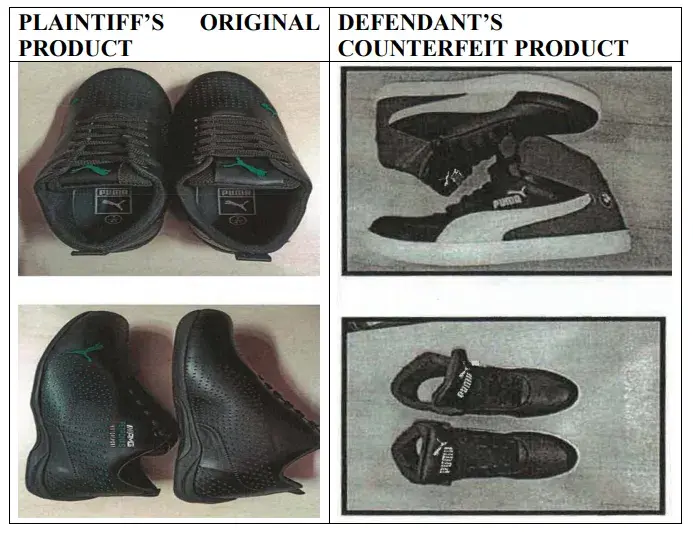By Priyanka Sukhija and Pallavi Paul
The Delhi High Court has awarded INR 8,00,000 (approx. USD 9,011) in damages and costs to global sportswear brand PUMA SE in a landmark trademark counterfeiting case against an e-commerce operator who sold fake Puma shoes through the website www.theshoeskart.com. The judgment, delivered by Hon’ble Mr. Justice Saurabh Banerjee reinforces strict judicial action against deliberate infringement of well-known trademarks.
Brief Background
PUMA SE, one of the world’s most reputed sports apparel and accessories manufacturers, filed a commercial suit[1] against defendant Himanshu Sharma for trademark infringement, passing off, and counterfeiting. The dispute originated in July 2021 when Puma received customer complaints about substandard quality shoes allegedly purchased as Puma products from the defendant’s website. An investigation uncovered clear evidence of the defendant selling counterfeit products bearing Puma’s registered trademarks i.e., PUMA/ and the logo
and the logo  without authorization.
without authorization.
Puma’s trademarks have been in continuous use since 1948 and have been registered in India since 1983 under Classes 18 and 25 of the Trade Marks Act, 1999. Significantly, Puma’s trademark was declared ‘well-known’ by the Trade Mark Registry[2] thereby, entitling it to enhanced protection.
Court Analysis and Findings
The court initially granted an interim injunction on August 18, 2021, restraining the defendant from using Puma’s trademarks and directing the Domain Name Registrar to suspend access to the website at URL www.theshoeskart.com and its associated IP address. Despite service of summons by publication on January 07, 2024, the defendant failed to appear or file a written statement within the permissible timeframe. Consequently, the defendant’s right to file a written statement was closed on February 06, 2025, and ex-parte proceedings commenced.
Puma moved an application seeking summary judgment[3] relying on its well-known mark status, the continuous and prior usage of the Puma brand, and uncontested documentary evidence establishing counterfeiting.
Justice Mr. Banerjee observed that the defendant’s products were ‘blatant copy/counterfeit/rip-off/replica’ of Puma’s products, with all essential elements of Puma’s trademarks, including the logo and form strip device copied without any variation. The Court noted that since the defendant never denied or disputed any averments or documents filed by the plaintiff, all allegations and evidence were deemed admitted. Comparative photographs of the Puma’s and defendant’s products as depicted in the judgement is copied below:
The court found the defendant’s conduct to be mala fide, stating that the adoption and use of Puma’s trademarks was done with clear intention to ride upon the goodwill and reputation of Puma’s well-established brand. It was emphasized that the defendant demonstrated clear intention of counterfeiting since they operated in the same line of business, through identical trade channels, and targeted the same customer base as Puma.
The court relied on several precedents establishing stringent standards for counterfeiting cases such as the case of Koninklijke Philips N.V. & Anr. v. Amazestore & Ors[4], wherein the Delhi High Court held that deliberate and mala fide infringement warrants a stringent approach in awarding damages. Reliance was also placed on the case of Cartier International A.G. and Ors. v. Gaurav Bhatia and Ors.[5] which held that when elements of counterfeiting are apparent and a defendant who willfully evade judicial proceedings should not benefit from their non-compliance.
Final Order
The Court decreed the suit in Puma’s favor, granting permanent injunction against the defendant from manufacturing, selling, advertising, or dealing in any goods bearing Puma’s trademarks. The defendant was ordered to pay INR 5,90,000 (approx. USD 6,645) as actual costs and damages of INR 2,10,000 (approx. USD 2,365), (totalling INR 8,00,000) to be paid within ninety days, with 6% interest rate per applicable in case of default.
Conclusion
This judgment sends a strong deterrent message to counterfeiters operating through e-commerce platforms in India. By granting summary judgment and substantial damages despite the defendant’s absence, the Court demonstrated that non-participation in proceedings will not shield infringers from liability. The decision also reinforces that well-known trademarks receive enhanced protection under Indian law, particularly against deliberate counterfeiting that exploits brand goodwill to deceive consumers.
[1] CS(COMM) 383/2021
[2] Trademark Journal No. 2144 dated February 19, 2024
[3] Order XIIIA read with Order VIII Rule 10 of the Code of Civil Procedure
[4] AIRONLINE 2019 Del 826
[5] 2016 (65) PTC 168 Del


